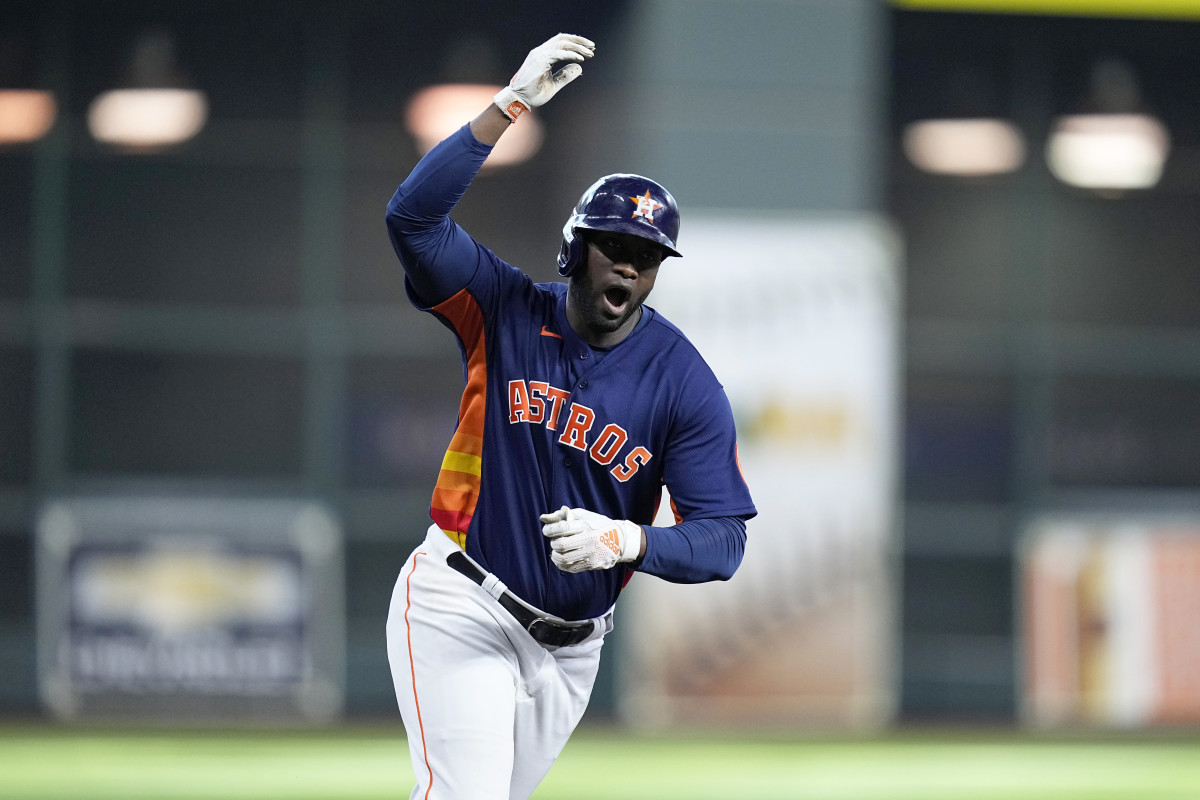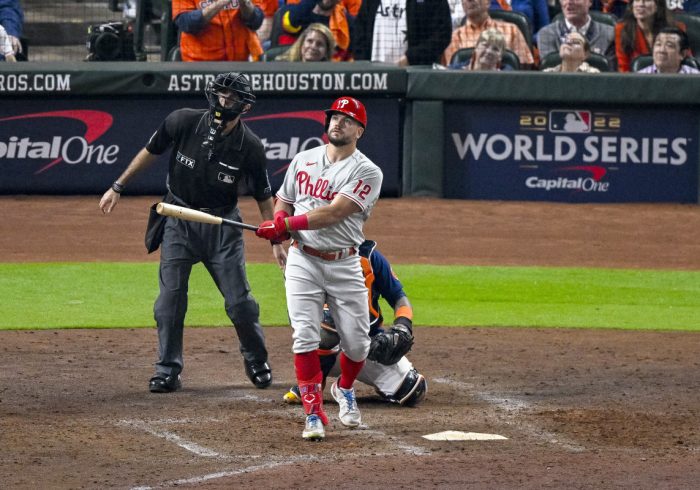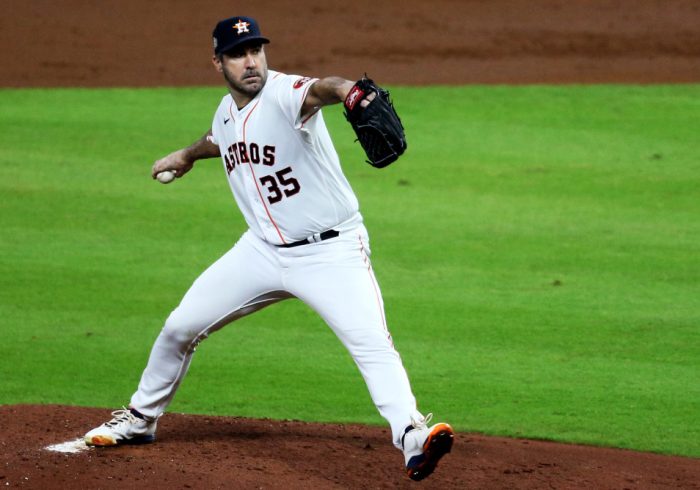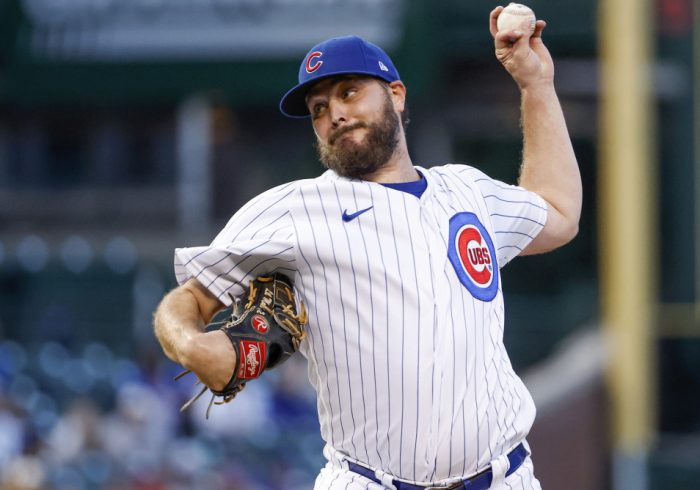Alvarez is 4-for-8 with two game-winning home runs in the first two ALDS games against the Mariners.
Kevin M. Cox/AP
Sometimes, there is absolutely nothing you can do. A hitter is so locked in that it doesn’t matter how good your pitcher is or where you pitch to him, or even whether you pitch to him at all—he’ll find a way to beat you.
That’s Yordan Alvarez right now against the Mariners. The Astros‘ slugger, this generation’s Willie McCovey, swatted his second game-winning home run in as many games in the sixth inning yesterday off Seattle ace Luis Castillo to give Houston a commanding 2–0 series lead in this best-of-three ALDS.
It’s hard to fault Castillo for Alvarez’s blast. He threw Alvarez two 98-mph sinkers off the outside part of the plate. Alvarez saw just six power sinkers (95-plus mph) off the outside corner during the regular season; he swung at only two of them, fouling both of them off. Broadening a bit here, Alvarez swung at eight of the 49 fastballs (four-seamers, two-seamers, cutters and sinkers) he saw this season that were off the plate away and had velocities of at least 95 mph. He put only one of them in play, a groundout to short off a 95-mph four-seamer from Angels righthander Oliver Ortega.
The postseason is heater-hunting season, though, for Alvarez. Over the two games against Seattle, Alvarez has seen 10 fastballs (four-seamers and sinkers) with velocities of at least 95 mph and swung at six of them. He fouled off the first five and took Castillo deep on the sixth. Three of the four pitches he took were non-competitive pitches; the other was a perfectly located 101-mph four-seamer with a little bit of run on the low-inside part of the zone that he took for a called strike one.
(It’s worth noting that Alvarez has seen two more fastballs this series, both sinkers from Robbie Ray, but neither of them hit 95 mph or was off the plate away. He fouled off the first one. The second he hit for the Game 1 walk-off dinger.)
So, really, aside from intentionally walking Alvarez in the sixth—a decision that would have come from the dugout—Castillo did about all that he could to prevent an Alvarez homer (except that, well, he didn’t prevent it). The home run pitch was a bit closer to the corner than the one Alvarez had fouled off, but it was still outside the zone, and against a left-handed power hitter like Alvarez, the biggest concern is giving him something to drive to right field. It’s logical to think there was no way Alvarez could hit that pitch to right without rolling it over for an easy groundout or lifting a lazy flyout to end the inning. Instead, he locked his front hip, shot the barrel at the power sinker and smacked it into the Crawford Boxes.
Oh, and about that intentional walk option. Manager Scott Servais did elect for that when Alvarez came up with two outs and a runner on first in the bottom of the eighth, the same situation except it was two innings later, in a one-run game in favor of the Astros, not the Mariners, and reliever Andrés Muñoz was on the bump instead of Castillo. This put Jeremy Peña, representing a much-needed insurance run, on second and Alvarez on first for Alex Bregman, who ripped a single to right to make it 4–2 Houston.
Sometimes, there really is absolutely nothing you can do.
Have any questions or comments for our team? Send a note to [email protected].
1. THE OPENER
Freddie Freeman is the subject and jumping off point for today’s SI Daily Cover story.
Ashley Landis/AP
“On June 24, [Freddie] Freeman, the Dodgers’ All-Star first baseman, returns to Atlanta, where he played 12 years before moving this season to L.A. At a press conference, he chokes back tears and clutches a white towel.
“I watch that press conference on my laptop with my 10-year-old daughter, Rose. She has followed Freeman through hundreds of big hits and signature hugs, for opponents and teammates alike. And on one sun-kissed September afternoon against the Red Sox, he even sent Rose a wave, on her birthday.
“Freeman, it’s said, is the type who wears his heart on his sleeve. Around his neck, he wears a chain with a cross that unscrews to reveal a strand of hair from his late mother, Rosemary. She died of skin cancer when Freeman was 10.
“I hold Rose’s hand. She squeezes. We root for Freeman to find the right word, any word.”
That’s Jeremy Collins, writing in his incredible personal essay that begins with this scene of watching Freeman’s press conference with his daughter and develops into a four-generation story about his family’s connection through baseball and a few of its biggest stars. Simultaneously, Collins profiles Freeman’s journey from 10-year-old boy taking batting practice with his father to becoming an All-Star first baseman, now for the Dodgers. This is baseball writing at its best.
The Late Poetics of Freddie Freeman by Jeremy Collins
From Atlanta to L.A., the sweet-swinging lefty heals and enchants and connects us—to Hank Greenberg and Roberto Clemente and Dale Murphy … and to family long gone.
2. ICYMI
The Astros’ win over the Mariners was the only game played yesterday, so instead of recapping the most recent action, let’s get you caught up on some stories from earlier in the week.
Astro in Exile: Jeff Luhnow’s Next Act by Stephanie Apstein
Nearly all involved in the Astros’ cheating scandal have apologized and been welcomed back by MLB. But not Luhnow. Now running lower-level soccer teams in Spain and Mexico, the former GM says he doesn’t have anything to prove to anyone.
The Most Improbable Caught Stealing in a Long, Long Time by Matt Martell
Everybody knew Mookie Betts was stealing, and it was all but guaranteed that he would be safe. Except he wasn’t.
San Diego Saved by the Unlikeliest of Pitches From the Unlikeliest Hero by Tom Verducci
The Padres held on for a nail-biter of a Game 2 win over the Dodgers thanks to a heroic effort from their bullpen—most notably, Robert Suárez, a 31-year-old rookie reliever.
Kyle Wright Delivers Yet Another Win When Atlanta Needs It Most by Emma Baccellieri
The 2022 MLB wins leader took the mound Wednesday in what amounted to a must-win game for the Braves. He, and his curveball, performed with aplomb.
Harrison Bader’s Other Play That Led to the Yankees’ Win by Matt Martell
His home run tied the game. His fielding saved it.
Gerrit Cole Shines Under the Bright Lights in the Bronx by Stephanie Apstein
Pitching in his first postseason home game as a Yankee, Cole exhibited escapability that’s occasionally eluded him with New York.
3. WORTH NOTING from Matt Martell
Peña scored two runs and reached base three times in yesterday’s 4–2 win over the Mariners.
David J. Phillip/AP
I mentioned Astros shortstop Jeremy Peña in the opening section of this newsletter, but he deserves more recognition for his crucial role in yesterday’s win. Sandwiched between Jose Altuve and Alvarez in the Houston lineup, Peña went 2-for-3 and scored two of his team’s four runs.
Facing Castillo with two outs in the sixth and the Astros down by a run, Peña fought off a 98-mph breaking in on his hands and fisted a bloop single to center field. This allowed Alvarez to come to the plate with a man on first when he cranked his go-ahead homer, instead of leading off the seventh.
Then, with two outs in the eighth, Peña worked a seven-pitch walk, which set up Alvarez’s intentional walk, which led to Bregman’s RBI single.
Undoubtedly, we’ll remember Alvarez’s contributions yesterday. Let’s not forget Peña’s, either.
4. W2W4 from Matt Martell
Because Yankees–Guardians was postponed yesterday, we’ve got three games set for today, beginning with that Game 2 at Yankee Stadium (first pitch 1:07 p.m. ET). The pitching matchup should be a good one. Nestor Cortes Jr. starts for New York, looking to give his team a 2–0 series lead, against Cleveland’s Shane Bieber, who dazzled in the wild-card round against the Rays. This is the first of a possible four straight days of games between the two teams. After this afternoon’s game, they will head to Cleveland for Game 3 tomorrow night, and if necessary, they will play Sunday night in Cleveland and Monday night back in the Bronx.
Later today, the Braves and Phillies play the first playoff game in Philadelphia since 2011. Atlanta manager Brian Snitker said Citizens Bank Park would be a “so-called hostile environment,” which Philly fans surely will take as a challenge to be even rowdier. Aaron Nola gets the start for the Phillies against Braves rookie sensation Spencer Strider, who is making his first start since he strained his oblique last month. First pitch is set for 4:37 p.m. with the series tied at a game apiece.
Finally, the Padres host the Dodgers at 8:37 p.m. ET at Petco Park—the site of another “so-called hostile environment”—for the first postseason game in San Diego since 2006. Blake Snell gets the ball for the Padres against Tony Gonsolin, who went an absurd 16–1 with a 2.14 ERA in 24 regular-season starts before a forearm strain in late August kept him on the injured list. He returned Oct. 3 for a two-inning tuneup against the Rockies and allowed one run.
5. THE CLOSER from Emma Baccellieri
If there has been one especially remarkable thing about the Braves’ strategy of locking up young talent, it has been that the front office never, ever allows details to leak ahead of time. You did not see rumors of these extensions filtered through reporters, or potential figures bandied about on Twitter, or any other public hints. You just saw the news announced via official team press release when all was said and done. And the same is apparently true of how the team announces a playoff game starter! Sure, Braves manager Brian Snitker had suggested that rookie starter Spencer Strider might be healthy enough to start Game 3. But he declined to name a starter after Game 2 on Wednesday and further declined to say much else in his travel-day press conference yesterday. It didn’t take much to read between the lines: If Strider wasn’t ready, the team surely would have committed already to Charlie Morton, but there was still nothing concrete with nothing leaking in either direction. Yet when this morning rolled around … there you had it: Strider will go in Game 3 and Morton in Game 4.
That’s all from us today. We’ll be back in your inbox tomorrow. In the meantime, share this newsletter with your friends and family, and tell them to sign up at SI.com/newsletters. If you have any questions or comments, shoot us an email at [email protected].



